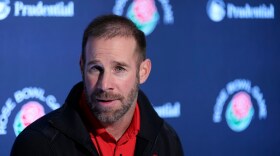-
No date has been set, but the Mammoth will play the Colorado Avalanche at the home of the University of Utah football team.
-
Forecasting snow conditions in Utah’s mountains can be tricky, but accurate predictions are vital for everything from ski trips to avalanche safety. An AI forecast tool developed at the University of Utah might help.
-
“After discussions with coach Whittingham, his representatives and the University of Michigan, we have granted their request to allow him to join the Michigan program immediately,” Utah athletic director Mark Harlan said.
-
Scalley will take over after No. 15 Utah plays Nebraska in the Las Vegas Bowl on December 31. He’s been the defensive coordinator under Whittingham for 10 seasons and has been a part of the Utah coaching staff since 2007.
-
After a long and successful run as head coach, Kyle Whittingham is stepping down from the University of Utah’s football program. This marks the end of a three-decade-long era of Utah football.
-
The University of Utah athletic programs could generate millions in new capital, but one industry observer says that could come at a cost for fans and smaller sports.
-
Threats to judges are nothing new, but political pressure after recent high-profile rulings risks courts becoming “arenas of political retribution,” according to the American Bar Association.
-
How we engage with people we disagree with has been a topic of conversation across the political spectrum in the wake of Charlie Kirk’s death. Some Utah students have seen a regression in how politics is discussed on campus.
-
There was one dissenting vote on the recommendation from the Higher Education Appropriations Subcommittee. The higher ed budget reinvestments were mandated by the Legislature.
-
The Monroe Canyon fire has burned 75 square miles, and the wind-whipped fire along the Grand Canyon has become a "megafire." Both are burning so hot that they are spurring the formation of "fire clouds."
-
The Trump administration has already cut almost $30 million in research grants to the University of Utah. Another $110 million annually could be on the line.
-
While officials in Kerr County, Texas, face scrutiny over the timeliness of flood alerts, an expert in Utah says the state is prepared when it comes to natural disasters.
Play Live Radio
Next Up:
0:00
0:00
Available On Air Stations












